How to Sell Alcohol Online: A 10-Step Roadmap to Success
If you click to purchase a product or service based on our independent recommendations and impartial reviews, we may receive a commission. Learn more
So, you want to start selling alcohol online? That’s the spirit! With online alcohol sales expected to reach $18.53 billion in the US by 2027*, if you want to start selling alcohol on your website, now’s the time to get started, especially with website builders making it easier than ever to learn how to sell online.
However, you should know that starting an alcohol ecommerce business – or as we like to call it, an al-commerce business – involves some important legal steps that you can’t afford to skip.
But don’t panic. As always, we’ve got you covered.
This article will cover everything you need to know about selling alcohol online, from understanding your local laws to marketing your products. We’ll also be uncorking some tasty tips to help your business make a splash online.
1. Obtain the Licences
The most important step of all, you’ll need to get the proper licenses before you can start selling alcohol online. This can be done by visiting the TTB.gov website and following these steps:
Step 1: Visit the state alcohol control boards on the TTB.gov website
Step 2: Apply for a winery, brewery, or distillery licence from your state
Step 3: Apply for a Shipper’s Licence and ensure it enables you to sell online
Step 4: Enquire about an Importer’s Basic Permit if you want to import from overseas

It may take some time for the governing bodies to approve your applications, so make sure you get your applications done before you start building websites, designing logos, and calling alcohol suppliers. However, once you’re licensed and almost ready to sell, the fun stuff can begin!
Top tip
Research your local state laws on shipping alcohol. For example, Alabama, Oklahoma, and Utah strictly prohibit the direct shipment of alcoholic beverages to consumers, so you might as well forget about selling online to those citizens. Sorry, folks!
2. Find Your Niche
The online alcohol industry is booming. In 2018, US ecommerce sales of wine reached $8bn, while worldwide ecommerce sales of liquor reached $6.5bn.
You’ll need to find your niche in order to get your business found more easily online. That’s particularly true if you’re from New Hampshire, the state with the highest alcohol consumption per capita.
Whether you want to sell whacky-tasting whisky or avant-garde vino, selling a niche product could be a risk that pays off – literally.
You don’t always need to go down the unique-selling-point route, though. Finding your niche might involve deciding whether to sell wine, gin, brandy, or beer – or all of them together! If you’re moving your brick-and-mortar shop online, then why not consider adding a greater variety of alcohol to your online shelves?
Top tip
Do some competitor research to see which types of alcohol your would-be competitors are selling – or better yet, aren’t selling – and work from there to find your market niche.
3. Source a Supplier
Unless you’re brewing beer and growing grapes by yourself, you’ll need an alcohol wholesale supplier to ensure your online store never runs dry. These suppliers can produce and distribute alcohol for you (if you don’t want to organize your own shipping carrier), taking the hassle out of the logistical side to selling alcohol online.
Think of these suppliers as web developers – they keep everything running smoothly in the backend, and make improvements that aren’t physically seen by customers. In this scenario, you, the vendor, are more like a web designer focused on building your brand and fostering a positive user experience.
Some of the best alcohol suppliers in the US include:
- Southern Wine & Spirits of California
- Empire Merchants North LLC
- LibDib
- Youngs Market Company
- A. Hardy USA
To strike up a supplier relationship, you’ll normally need to upload your alcohol licences to the website and follow the respective steps to becoming a partner.
Top tip
Some suppliers will specialize in producing different types of alcohol. If you’re looking to sell wine online, then use one of the California-based suppliers. That’s the wine country, after all!
4. Create Your Brand
When it comes to selling alcohol online, there’s a lot of stiff competition. You need your business to cut through the noise, and learning how to build your brand online will help you do so. But what does it take to build a brand identity?
There is no ‘one size fits all’ when building a brand. More than just a logo, a brand represents the values that your business stands for, and is unique to each business. When building your alcohol brand, there are three steps that you don’t want to neglect:
- Develop brand values
Developing brand values will help customers to understand your business better, and if they can relate to your values, encourage them to purchase from you over the competition. For example, does your alcohol brand stand for environmental issues? Or do you value humor and puns as the best marketing policy?
Find out what a unique value proposition is in our full guide!
- Design a killer logo
In the eyes of the consumer, a shoddy logo represents a shoddy business. Your logo is how customers will recognize your brand online, so you can’t afford to skimp on it! We’d recommend hiring a graphic designer, or using the affordable freelance site, Fiverr, if you’d like to save a bit of cash.
- Inspire trust
According to the 2019 Edelman Brand Trust Report, trust is almost as important to consumers as product quality and value, with 81% of respondents saying they ‘must be able to trust the brand’. This survey also found that if a brand displayed unethical behaviour, 40% of consumers would never use that brand again.
It takes more than just a fresh logo to build trust in your website – you’ll need to respond to negative consumer reviews, be transparent on pricing, and stick to your word when it comes to things like delivery times and product quality. Inspiring trust will keep your customers happy, and coming back for more!
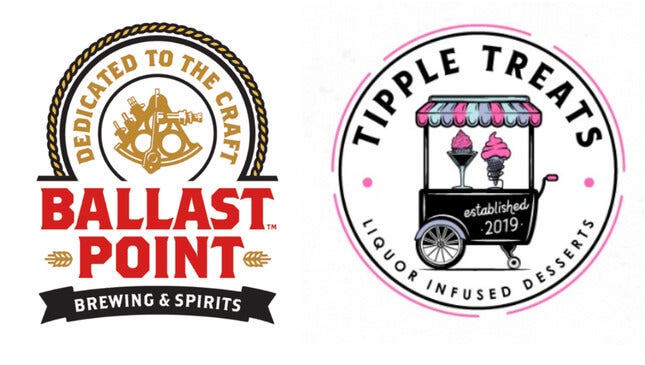
Top tip
Color consistency is key. When designing your website, labels, or logo, you should ideally stick to using one primary color and a complimentary secondary color.
5. Build an Online Store
Whether you’re starting your business from scratch or moving your high-street store to the online market, you’ll need to build an online store. When it comes to building your website, you’ve got two options to choose from:
- An ecommerce website builder such as Shopify, Wix, or Square Online
- WordPress combined with an ecommerce plugin like WooCommerce
No matter which one you select, we can help you get started, covering all the major bases when learning how to build an online store. Below, we’ll dive a bit deeper into each of the options on offer.
Best Ecommerce Builders to Sell Alcohol Online
- Wix – Best overall ecommerce builder
- Shopify – Best for scaling your online store
- Square Online – Best free plan
Using an Ecommerce Builder
Ecommerce website builders are perfect for tech beginners, providing intuitive design tools, beautiful templates, and customer support, all in one place. Website builders come with fixed monthly pricing, which makes calculating the website costs much easier.
When it comes to selling alcohol online, our favorites are Shopify, Wix, and Square Online. Each comes with a great set of features to help make your selling dreams a reality.
Wix
Best all-around ecommerce builder for businesses selling less than 10 products

Why do we like it?
- A good variety of templates specially designed for selling food and drink online
- Sell across Facebook and Instagram
- Easy to use, and the platform our users were most likely to recommend after Shopify
- Offer delivery to your customers’ doorsteps or curbside pick-up
- Set up subscriptions – ideal for starting a wine or beer club!
- Ability to add a blog to your store
- Build an online store for $29 per month
Who do we recommend it for?
- Sellers with an inventory of less than 10 items
- Those who want to add a blog to their store
- Beginners who aren’t familiar with building a website
Shopify
Best if you have a large store and want a deeper insight into your data and product performance

Why do we like it?
- Purpose-built ecommerce solution – in our research, it came out on top for sales features
- Impressive inventory features capable of supporting large numbers of stock
- Create collections to split your alcohol products into different categories
- Excellent data features, giving store owners a deep insight into their performance
- The platform our users were most likely to recommend
- Build an online store for $29 per month
Who do we recommend it for?
- Sellers with a bigger inventory of products
- Those who want lots of ways to present their products e.g. in collections
- Sellers who don’t need a blog as part of their store
- Users who are somewhat familiar with building a website, or willing to invest time in learning to navigate Shopify’s interface
Square Online
Best for selling in-person and online, without spending a cent
Why do we like it?
- Perfect for smaller sellers who still want a powerful inventory
- Square’s partnership with DoorDash means you can offer on-delivery for your customers
- Add age verification pop-ups when selling alcohol
- Take payments online and in-person, syncing your inventory as you go
- Rated the best value for money in our research
- Build an online store without spending a single cent thanks to Square’s free plan
Who do we recommend it for?
- Businesses with a smaller inventory
- Sellers who want to begin selling without paying a monthly fee
- Those who want to sell in-person and online
- Sellers who want to offer on-demand delivery
Using WordPress With an Ecommerce Plugin
Whereas an ecommerce builder sets some creative boundaries through its templates, WordPress – when equipped with its top ecommerce plugin, WooCommerce – offers unlimited creative freedom, but only if you know how to code. WooCommerce is less of a ‘ready-out-of-the-box’ solution than a website builder, but it does enable you to create a truly bespoke online store.
WooCommerce is known as an open source software – it’s free to install, but you’ll need to find and pay for your own web hosting, security, and website themes. That’s really simple to do, however.
If you like the sound of WordPress and WooCommerce, then you’ll need to find a hosting provider. WordPress itself recommends Bluehost as the best option, and we totally agree. It comes with WooCommerce-specific price plans to make your life much easier, and it boasts a brilliant server uptime to ensure your alcohol website never has any performance hiccups.
Do you wish someone would just tell you exactly which online store builder you should use? You’re in luck! Our quick and easy quiz gives you a personalized recommendation, so you’ll know exactly which one is best for your needs. Click below to get started…
Top tip
Ask friends, family, and colleagues to test your website before you publish it. That way, you’ll gain an outsider’s perspective on how your website looks and feels, which should help you create the perfect experience for your future customers.
6. Create Compelling Product Descriptions and Visuals
It doesn’t matter what you’re selling online, your product descriptions and visuals need to be up to scratch.
As customers can’t see (or taste!) your products for themselves before they buy, you need to tell them all about them.

Your product descriptions should be detailed and informative, providing customers with information such as taste and flavor profiles, alcohol percentage, ingredients, and drinking instructions (e.g. does the drink need to be mixed with something else for optimal enjoyment?)
You’ll need at least one image for every item you list and sell on your ecommerce website. Make sure the images are high-quality and that you can clearly see the item. Keep the style of your images consistent throughout your product listings in order to help build a sense of brand identity.
Learn more about how to take product photos in our full guide!
Top tip
Don’t forget to optimize your product descriptions for your target keywords. Your product listing pages can be the ideal place to mention your keywords to help boost your website SEO.
7. Sort out Shipping
Your website, logo, and products are ready to go, with your licence taking pride of place at the center of your online store. But how can your customers go from clicking to sipping? The answer: shipping!
In the US, you can ship all types of alcohol via UPS and FedEx. To begin your shipping journey with either of these two shipping carriers, you must complete the following steps:
- Register an account
- Sign either the ‘FedEx Shipping Agreement’ or ‘UPS Agreement for Approved Wine and Alcoholic Beverage Shippers’
- Create your own shipping label, using the carrier’s own tool or a third party label designer
- Abide by the packaging requirements for your specific type of alcoholic beverage
- Select the adult signature service (because an adult must sign for the deliveries)
- Stick on your shipping labels to your products
- Ship
What about USPS? Well, due to an old law from 1909, the USPS isn’t legally allowed to deliver alcohol!
Top tip
Make sure you check the shipping regulations in your state or the states you’re planning to sell your products in. Some states prohibit the shipping of alcohol regardless of which delivery company you use. Luckily, ecommerce builders like Shopify allow you to set shipping exclusions so you can filter these states out to prevent any accidental orders!
If you choose to build your ecommerce store with Shopify, Wix, or Square Online, you’ll find plenty of shipping solutions to get your products on their way. Alongside the normal providers mentioned above, you can also offer curbside and in-store pickup. In fact, Square has recently partnered with DoorDash, allowing customers to place their order and have it delivered via a DoorDash delivery driver in minutes.
Top tip
Offer free shipping to help turn website visitors into regular customers – as many as 79% of US consumers said that free shipping would make them more likely to shop online.
Find Out More
- Read more about Shipping Products to get a crash course in the shipping process from start to finish
- Stuck on forming your Ecommerce Shipping Strategy? Luckily, our guide can help!
- Shipping can make or break your customer experience. Beat the competition by following these Ecommerce Shipping Best Practices
8. Handle Age Verification and Compliance
Of course, one of the most important elements to selling alcohol online is verifying the age of your customers.
You’ll likely find plenty of under-21s trying their luck and attempting to make a purchase from your online store and you have a legal obligation to ensure you have robust age verification measures in place.
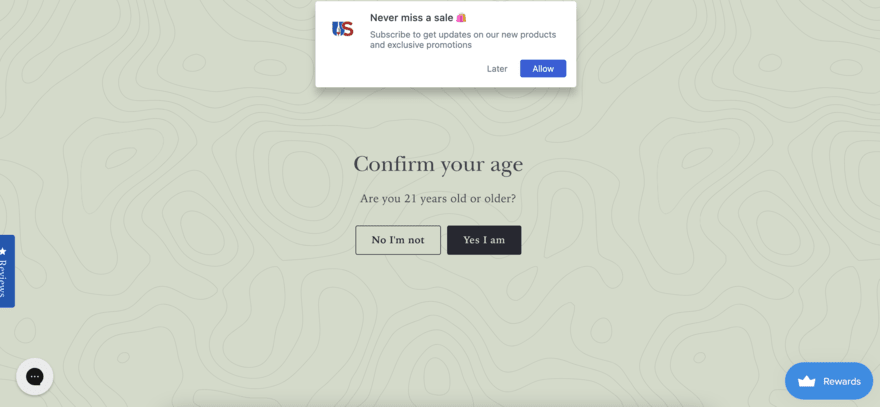
Many ecommerce website builders offer the option of adding an age verification pop-up to your website which can appear when a user first lands on your website and when they attempt to check out.
To help add an extra level of protection, some online alcohol sellers opt for a “signed-for” delivery option, which means customers must verify their age and show a form of ID upon delivery.
Top tip
Don’t forget to train your customer service staff on how to verify the age of a customer to ensure only those aged 21 and over are able to complete a purchase via your online store.
9. Market Your Products
You now know how to sell alcohol online, but the hard work doesn’t stop here. Yes, you can now deliver your beautiful brand to doorsteps around the world, but you need to promote your website and get your business out there before you can start earning serious money. In order to reach new customers and increase sales, you must nail your digital marketing.
First of all, you should connect your online store to social media. This feature is offered on both Wix, and Square Online, and enables social network users to click one button and jump straight to your online store.
Shopify is soon releasing the ‘Facebook Shops’ feature, which means Shopify will generate a Facebook store for you and seamlessly connect your Shopify inventory to a new Facebook storefront that looks stunning and creates a lovely shopping experience.
You can also set up a separate Facebook store. This means users can purchase your products directly from Facebook. Did you know that Mark Zuckerberg’s behemoth has over 2.6 billion active users? Think of all those untapped customers!

You should also compile a mailing list, so you can keep your brand fresh in the minds of consumers by sending regular newsletters and discount codes. Emails are like gold dust for digital marketers, so to start compiling your list, you could ask users to enter their email addresses in exchange for discounts, newsletters, or competition entries (if that’s how your alcohol delivery subscription service works).
Don’t forget to take your marketing efforts offline and visit any relevant roadshows or expos, such as the Big Apple Zinfandel Experience, the International Bulk Wine and Spirits Show in San Francisco, or the Digital Food and Beverage event on ecommerce.
Spend some time flicking through alcoholic beverage trade calendars, such as 10times, and see which events would offer the most reward for your business.
Top tip
Add a promotional video to your website to keep your visitors engaged with your brand – users spend 88% more time on websites that feature a video than those without.
10. Ensure Responsible Alcohol Sales
Every ecommerce store owner wants to make as many sales as possible, but selling alcohol online comes with certain responsibilities.
It’s important for you to promote responsible drinking and encourage customers to drink in moderation.
Throughout your online store you should aim to include content around drinking responsibly and avoiding alcohol misuse and ensure you have safeguarding policies in place.
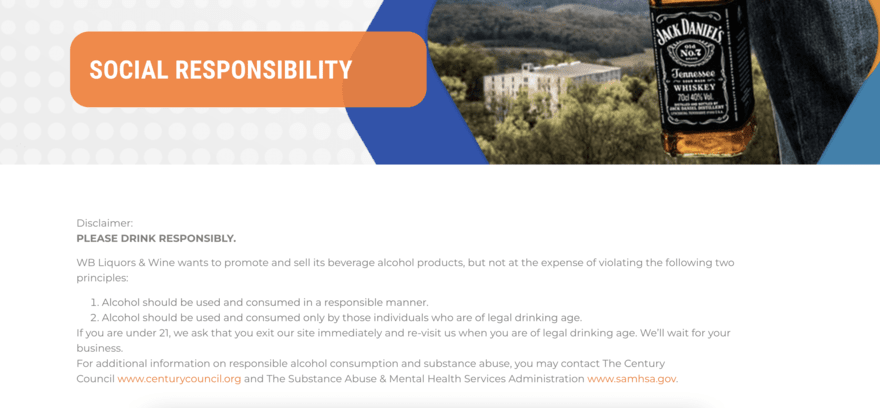
As a store owner you have the right to refuse sale to anyone who you think may be abusing alcohol or who is underage.
These responsibilities don’t have to hamper the success of your online store though, in fact, if you take them seriously and prove to customers that you care, you’ll actually end up growing a more loyal and appreciative customer base.
Top tip
Consider getting involved with responsible drinking initiatives as part of your online strategy. For example, you could donate a % of your profits to a relevant charity each year, or partner with an organization to provide expert content and advice.
How to Sell Alcohol Online: Summary
Selling alcohol online is like creating the perfect cocktail. Our steps are the ingredients, and your brand is the cocktail – you need to mix together all the components from the ingredients list in order to achieve delicious success. If you don’t follow each of our steps, then you’ll likely end up with unsavoury profit margins. With that in mind, let’s recap our steps.
How to Sell Alcohol Online In 10 Steps:
- Obtain the licences – visit TTB.gov and apply for your alcohol selling licence
- Find your niche – conduct competitor research to figure out which type of alcohol you’d like to sell
- Source a supplier – find a wholesale alcohol supplier that can keep your inventory from running out
- Create your brand – develop brand values and create a logo that inspire trust
- Build an online store – use WordPress or a website builder to create an online presence, depending on your skill level
- Create product descriptions and visuals – provide customers with all the information they need to make an informed purchase.
- Sort out shipping – register with UPS or FedEx to get your products delivered around the country
- Handle age verification and compliance – ensure your website has the correct age verification procedures in place.
- Market your products – connect your website to social media and collect customer emails to help your business grow
- Ensure responsible alcohol sales – always put your customers first.
Congratulations! You’re now ready to build your al-commerce empire. That deserves a toast. Anyway, we know that learning how to sell alcohol online can cause headaches if you don’t know where to begin – but with our ten steps, we’ve got just the tonic. Cheers!
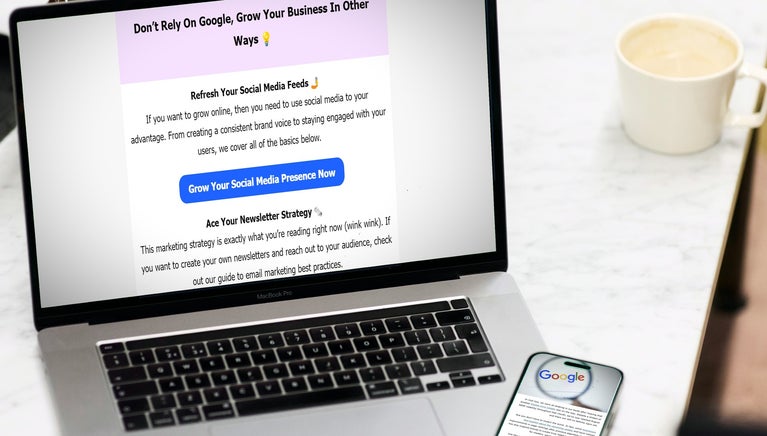



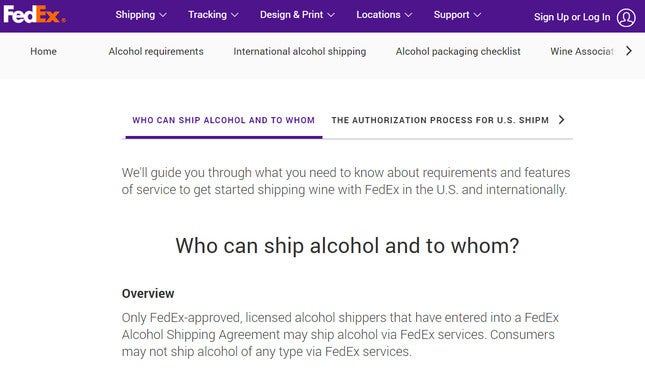
5 comments